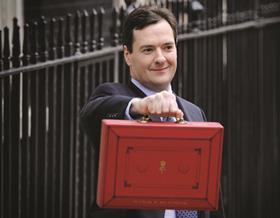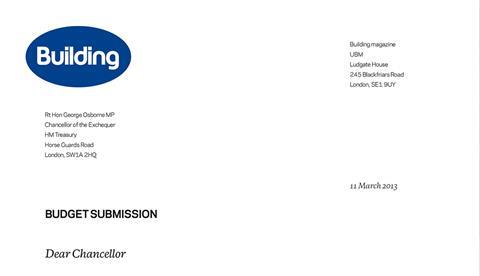Ahead of this weekŌĆÖs Budget, ║├╔½Ž╚╔·TV wrote to the chancellor to put the case for the green economy. LetŌĆÖs hope he listens

All of the advance signs seem to suggest that this weekŌĆÖs Budget will not be one to remember, with insiders already dubbing it the ŌĆ£empty BudgetŌĆØ. Certainly the Budget submission by the Confederation of British Industry (CBI) - usually a fairly carefully calibrated assessment of the middle ground between what businesses want and what they think is likely - called for a ŌĆ£modestŌĆØ ┬Ż2.2bn spending package, all culled from departmental underspends, and no additional borrowing.
Within the CBIŌĆÖs package comes a number of measures, such as ┬Ż1.25bn in cash for affordable housing, and ┬Ż500m of tax cuts to promote domestic refurbishment, which have been broadly reflected by the submissions from a range of construction bodies. If we look beyond the detail of these submissions, the overwhelming cry from the industry - echoed again by the CBIŌĆÖs policy director Katja Hall - is that delivery of the governmentŌĆÖs infrastructure programme has been ŌĆ£disappointingŌĆØ and needs to be bolstered.
The overwhelming cry from the industry - echoed again by the CBI - is that delivery of the governmentŌĆÖs infrastructure programme has been ŌĆśdisappointingŌĆÖ and needs to be bolstered
All of these moves, would of course be hugely welcome. But there is also a missing link to many of the calls for action ahead of the Budget: sustainability.
║├╔½Ž╚╔·TVŌĆÖs Green for Growth campaign has highlighted the opportunity to be gained for UK businesses from a greater commitment by the coalition to tackling climate change through implementing green policies. Chancellor George Osborne could provide a huge boost to the UK construction industry - and the cause of fighting global warming - simply by saying he is committed to the environmental agenda, and will prioritise policies to further it.
So this week we sent our own Budget submission, based on the support we have received for the Green for Growth campaign from across the property, development and construction industries. If you agree with the text of the missive below, then add your support to the campaign by visiting the website - or pen your own submission to the chancellor. With your help, it may be possible to make this weekŌĆÖs Budget not entirely empty after all.
║├╔½Ž╚╔·TVŌĆÖs letter to the Chancellor

As the principal trade magazine representing the breadth of the UK construction industry, we are in a privileged position to understand the health of a sector that represents more than 8% of UK GDP, and the measures that might prompt a growth in output in 2013.
We share the coalition governmentŌĆÖs aim to establish sustained growth in the UK economy, and support many of the steps taken to prioritise capital spending and support the housing market and project finance.
However, many of our readers have looked on with increasing alarm over the last two years at a series of policy measures and public statements that have cast doubt on the governmentŌĆÖs commitment to the green agenda.
For our readers this is a very serious problem, as a flourishing economy for sustainable and low carbon goods and services for the built environment has been a vital area where many construction firms see an opportunity for dynamic growth and innovation. Hence the launch in January of our Green for Growth campaign, which calls on the coalition to realise the potential of the sustainable economy as an engine of economic recovery, particularly in terms of generating export growth. You will know the CBI has estimated the potential growth boost to the economy from this sector at ┬Ż20bn by 2015, if the correct policy environment is in place.
Our campaign calls for action in five specific areas of policy, which are outlined below. However, the most significant single action you could take in next weekŌĆÖs Budget, without spending a single penny, is to give a clear and unequivocal commitment that the whole of the coalition government sees the development of a green economy as a strategic focus for the UK economy, and a vital future source of competitive advantage in the global marketplace for goods and services. This will require a declaration that rather than seeing a choice between green or growth, you see green as the source of the UKŌĆÖs continued prosperity.
The governmentŌĆÖs failure so far to turn the Green Deal into a credible plan to tackle the necessary scale of domestic refurbishment, its botched handling of the widely accepted need to reduce the feed-in tariff rate, and - most damaging of all - statements by yourself to the effect that you do not want the UK to be a leader in sustainability, have together dented the confidence of potential investors in the UKŌĆÖs commitment to sustainability.
The health of the construction industry relies on the decisions of clients of all kinds - public and private - to invest in the built environment; and the certainty that the UK is on a journey to become a low carbon economy is one of the key potential triggers for that investment. Investors will not make those decisions to invest - in low carbon energy, on an environmental upgrade to existing energy, on building new structures to the highest sustainability standards - if they do not believe it will be a priority for the country.
As well as prompting direct investment, this direction of travel would ensure the UKŌĆÖs position as a leader in the technologies and disciplines to tackle and mitigate climate change for affected countries around the world.
This commitment would cost the government nothing.
Furthermore, while we recognise that industry needs to take a lead on delivery, there are some things only the government can do to address clear and persistent market failures and create a level playing field. There are therefore policy actions that we think would flow from a clearer commitment to sustainability, none of which require additional government borrowing. Identified by our Green for Growth campaign, we feel these actions would have the most impact on economic activity on the ground given limited government resources. In summary:
1. Introduce long-term structural tax incentives to encourage householders to take up energy efficiency measures, and reconsider elements of the ŌĆ£consequential improvementsŌĆØ policy, which would be a powerful driver of the Green Deal. Incentives could be engineered to be fiscally neutral.
2. Consider a ring-fenced retrofit programme for public buildings, funded by a combination of the ┬Ż1.5bn annual government departmental underspend and other innovative finance mechanisms.
3. Stick to the commitment for all new homes and all new non-domestic buildings to be zero carbon from 2016 and 2019 respectively; and urgently clarify both the interim steps required through Part L and the allowable solutions policy.
4. Boost energy saving in commercial buildings by improving and extending Display Energy Certificates to all buildings and provide urgent clarity on the obligations in the Energy Act 2011 to phase out the letting of poorer performing buildings.
5. Encourage long-term investment in green infrastructure and improve confidence in the supply chain by enabling the Green Investment Bank to borrow now, and providing greater clarity on the future for low carbon energy generation.
6. There exists a remarkable degree of consensus around these measures, for which we have received support from 26 trade associations representing almost all of the property, development and construction industry. We have also received the direct support of 75 UK-based construction companies, with a combined annual turnover of more than ┬Ż20bn.
Our readers of course welcome a reduction in burdensome regulation, but it is vital to distinguish between unnecessary red tape and smart regulation, the latter being able to provide clear direction as the basis for industry investment, innovation and growth. A report by your governmentŌĆÖs Green Construction Board published last week demonstrated that the current trajectory of policy and regulation will not be enough to meet the cuts in carbon emissions required to hit legally-binding targets under the 2008 Climate Change Act. So even without the economic imperative, action needs to be taken.
We hope that you are able to support our proposals in the forthcoming Budget and beyond.
Yours Sincerely,




























No comments yet